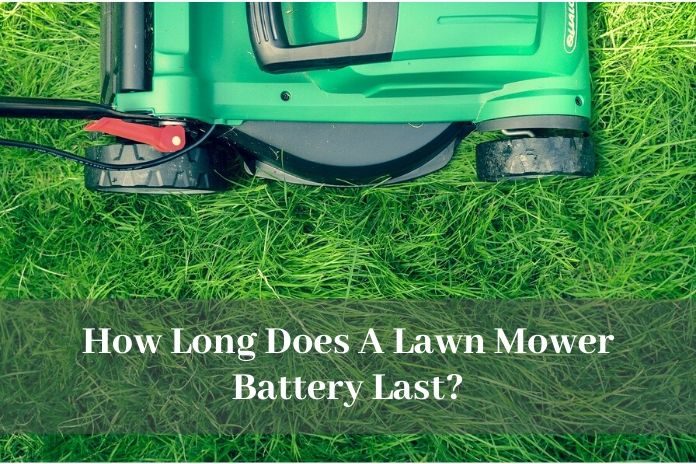
Just how long does a lawnmower battery last? If you own a mower, then this is something that you are likely very curious about.
In general, owners of lithium-ion powered lawnmowers can expect 500 charge cycles or 3-5 years of operation. Those who own lead-acid powered mowers can expect their battery to last 3 to 5 years; however, with proper maintenance and routine checks, they can extend the life of their lead-acid battery to ~12 years.
It is now crucial to understand the answer to this question will inevitably vary as it is based on a multitude of factors, including the types of mowers. So, keep reading to learn pertinent facts about the predominant kinds of lawnmowers and their battery lifespans.
Lean More About the Life Expectancy of Lawn Mower Batteries
Long gone are the days of riding mowers using pull-cord-style recoil starters. Most of the bigger riding mowers these days have a battery for starting up. Many even come equipped with basic alternators and voltage regulators to work as a functional charging system that keeps the battery juiced up.
Comparing lawn mower batteries to car batteries doesn’t always work precisely, considering how many differences there are. However, there are some definite similarities. For starters, many lawn mower batteries use cells that have lead plates that are submerged inside an acid electrolyte.
As the battery discharges, these plates get covered with sulfate, meaning the acid turns alkaline. As it is charged back up again, the plate sulfates return to the acid electrolyte, turning acidic once more. In both mower and car batteries, the antimony and acid content of a battery can eventually result in corrosion issues.
The lead-acid battery design used in many mowers and quite a few passenger vehicles is a technology roughly a century old. However, not all mowers use these kinds of batteries, so their lifespan varies.
Electric Lawn Mower Batteries Cost & Each Battery’s Lifespan
If you care about the environment or just don’t want to deal with fossil fuels, cordless electric lawn mowers are certainly appealing. However, the lifespan of the batteries is a common concern, since replacement batteries are added expenses that usually surprise you.
Replacement batteries for electric mowers typically range from $60 up to $100, but they can go as high as $350 on select high-end models. Electric mower batteries usually last for 500 charges or 3 to 5 years. Having said that, some fail in just one year, while others have been known to last up to 7. When the battery no longer holds a charge as long as it used to, then you know it’s going bad.
While those are the general facts about electric lawn mower batteries, there are two predominant categories within this area, and each is described in more detail in the next two sections.
1. Lithium-Ion Batteries
These kinds of batteries were first developed by researchers in the 1980s before they started getting commercialized in everything from phones to mowers. These batteries are still advancing as a technology, leading to longer lives, more energy storage, and faster charging. These kinds of batteries typically run from 3 to 5 years, or 500 charging cycles, whichever comes first.
2. Lead Acid Batteries
These were invented back in 1859 and were the first rechargeable batteries to be commercially available. A full discharge strains the battery cells to the point that it never hits full capacity ever again, meaning that every discharge lowers the capacity ceiling. You can only expect 200 to 300 total charging cycles, usually in a 3 to 5-year lifespan, but some actually last up to 12 years.
Managing Your Lawn Mower Battery To Extend Your Battery Life
There are fortunately things you can do to help your batteries last longer. If your mower has brushless motors, then this helps out, since a brushless motor is only going to require the energy it needs at a particular moment.
For example, if you mow thick grass, this strains the motor more. A brushless motor will sense the additional strain and draw more juice from the battery for it. However, once that thick grass is cut, and the lawn thins out, a brushless motor will use less energy.
1. Storage
Lead-acid batteries aren’t as sensitive to changes in temperature as lithium-ion batteries, but both have preferred temperature ranges they work best in. Store both kinds of batteries indoors during winter, in a climate-controlled area if you can.
Lithium-ion batteries are best stored from 50 up to 75 F, whereas lead-acid batteries need to be in a range of 40 up to 75 F. Each kind of battery should be stored fully charged and kept fully juiced all through their storage season.
2. Charging Your Batteries
The reason for full charges in the case of lead-acid batteries is that they have a sort of ‘memory.’ A depleted lead-acid battery is never going back to a 100-percent charge.
Lithium-ion batteries, fortunately, do not have this ‘memory’ so they can be totally drained before they need to get charged back up; having said that, it’s best to do full charges and full depletions on lithium-ion batteries so that you can minimize how many charging cycles you use, which extends the life of the lithium-ion battery.
Is Your Lawn Mower Battery Dead for Now or Dead for Good?
The battery in your lawnmower can lose the charge it had in storage or when unused in a long drought. The first thing you should do is to let it charge for several hours. Proper maintenance of a totally charged battery can add years to its life.
Related Article 1: How Long Does It Take To Charge A Lawn Mower Battery?
Related Article 2: How To Charge A Lawn Mower Battery
If you can’t crank your mower engine, it cranks slowly, or you get a clicking noise, then you might have a dead battery. Locate it; it’s typically just under the seat. Use a wrench to tighten any loose cables.
If you have a wet-cell model, you can use a flathead screwdriver to remove any caps. If your water level isn’t full, refill the battery cells. However, only use distilled water, as tap water and other kinds of bottled water might have mineral content that can result in corrosion and less efficiency.
If you have a multimeter handy, you can use it to check the voltage of a battery for hard numbers. You might also be able to get the battery tested by a professional technician at an automotive or home and garden equipment store. Always consult the manufacturer’s instructions for specific facts particular to your make and model of a lawnmower to know things that apply only to you.
Sources:
1. The Truth About Electric Lawn Mower Horsepower – StevePake.com
2. Lithium-Ion Battery Maintenance Guidelines – Newark Electronics





